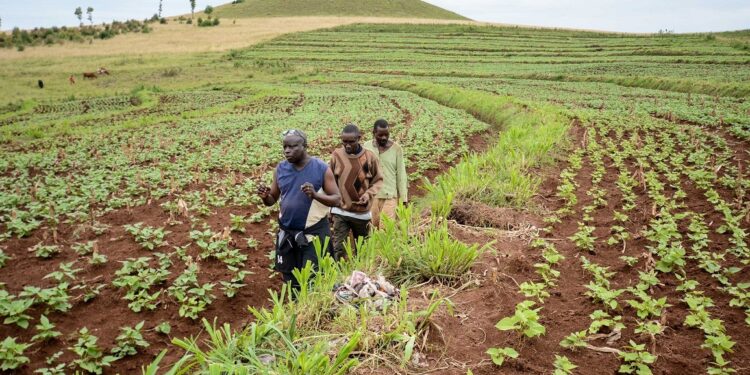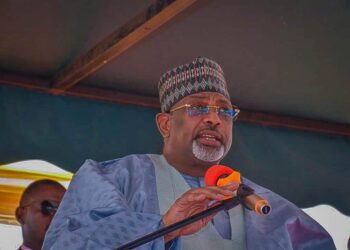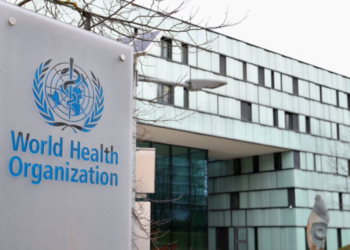The Federal Government collaboration with the United States Agency for International Development (USAID) Feed the Future Agricultural Extension and Advisory Services Activity in Nigeria has empowered 311 Micro, Small, and Medium Enterprises (MSMEs) over the past four years to enhance the agricultural productivity of smallholder farmers.
Jean–Pierre Rousseau, Director of Winrock International, USAID, stated this during a National Impact Workshop on Innovative Market-led Extension Service Delivery themed “Innovations in Market-Led Extension Service Delivery in Nigeria,” held in Abuja on Wednesday.
Jean–Pierre Rousseau highlighted the importance of extension services in driving agricultural innovation.
He remarked, “Today, we have over 311 MSMEs serving as change catalysts, bringing innovation, information, and productivity-enhancing inputs and services to the doorstep of over two million smallholder farmers.”
He noted that MSMEs have transformed extension services from simple information dissemination into a more robust, entrepreneurial enterprise, thereby fostering agricultural productivity and innovation.
Feed the future agricultural extension.
The Minister of Agriculture and Food Security, Sen. Abubakar Kyari, represented by Dr. Deola Lordbanjour, Director of Extension Services in the Ministry, described agricultural extension services as a crucial tool for delivering innovative solutions to smallholder farmers.
He noted that the partnership with USAID has spurred business growth and created jobs for both youth and women, in addition to enhancing market access for MSMEs and farmers.
“The impact of this collaboration spans new business solutions, enhanced business growth, and created jobs for both youth and women while boosting access to market for MSMEs and farmers,” Kyari said. He added that the partnership has contributed to the sustainable development of Nigeria’s agricultural sector, significantly improving productivity.
Transformation of MSMEs
According to Kyari, since 2020, the collaboration has identified and implemented impactful agricultural practices, turning MSMEs into key players in the extension service landscape.
“We have jointly identified several impactful agricultural practices as business solutions for farmers, transforming MSMEs into key players in agricultural extension services,” he stated.
He further emphasized that the government’s mission has been to provide efficient, demand-driven services to farmers, particularly youth and women, by encouraging the adoption of new agricultural technologies and facilitating access to markets.
Dr. Benjamin Odoemena, Chief of the Party for USAID, provided insights into the five-year development initiative funded by USAID.
He explained that the program seeks to increase access to improved agricultural technologies for 2 million farmers across several states, including Benue, Cross River, Delta, Ebonyi, Kaduna, Kebbi, and Niger.
He emphasized that MSMEs are critical to facilitating learning, replication, and scaling innovative agricultural models.
The workshop also highlighted the transformative impact of the initiative through testimonies from farmers. Dorcas Shoja, a farmer, expressed gratitude to USAID’s Feed the Future initiative for introducing modern agricultural practices. “We (farmers) are happy now, people come to observe my farms and are joining us to learn about the MIPs,” she said.
What you should know
Nairametrics reports that the United States Agency for International Development (USAID) successfully mobilized $244 million in agricultural investments through its “Feed the Future Nigeria Agribusiness Investment Activity.” This five-year initiative supported over 18,000 Micro, Small, and Medium Enterprises (MSMEs) across seven states: Benue, Cross River, Delta, Ebonyi, Kaduna, Kebbi, and Niger.
The program significantly enhanced the operations of these MSMEs, which play a vital role in local economies, boosting their productivity and growth.
Agriculture remains a key pillar of Nigeria’s economy, employing nearly 35% of the workforce and contributing approximately 23.69% to the nation’s GDP.
Despite its critical role, the sector faces challenges such as high operational costs, limited access to finance, and regulatory hurdles. USAID’s Agribusiness Investment Activity aimed to address these issues, empowering MSMEs to expand and focus on improving food production in Nigeria.




















